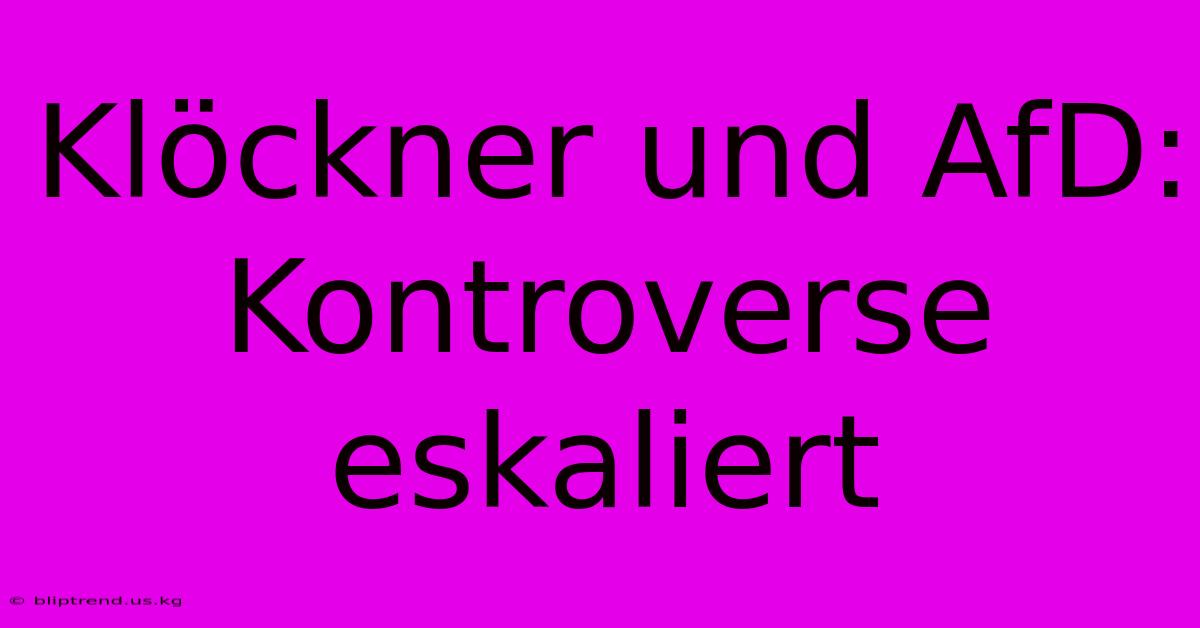Klöckner Und AfD: Kontroverse Eskaliert

Discover more in-depth information on our site. Click the link below to dive deeper: Visit the Best Website meltwatermedia.ca. Make sure you don’t miss it!
Table of Contents
Klöckner und AfD: Kontroverse Eskaliert – A Deep Dive into the Growing Conflict
Introduction:
The escalating conflict between Julia Klöckner, a prominent figure in German politics, and the Alternative für Deutschland (AfD) party has become a major point of contention in the current political landscape. This article delves deep into the nature of this controversy, analyzing its origins, key events, and the broader implications for German society and politics. We will examine the specific points of friction, the rhetorical strategies employed by both sides, and the potential consequences of this ongoing feud.
The Origins of the Conflict:
The conflict between Klöckner and the AfD isn’t a recent phenomenon; it’s rooted in fundamental ideological differences and contrasting approaches to political discourse. Klöckner, a member of the CDU (Christian Democratic Union), represents a more centrist, pro-European stance, often emphasizing consensus-building and pragmatic solutions. The AfD, on the other hand, occupies a far-right position on the political spectrum, characterized by its nationalist, anti-immigration, and Eurosceptic rhetoric. These inherent ideological clashes inevitably lead to conflict.
Early clashes often involved disagreements over policy issues such as immigration, climate change, and the EU. Klöckner’s criticisms of the AfD’s stances on these matters, often framed within the context of democratic values and societal cohesion, were met with equally sharp rebukes from AfD representatives. These initial disagreements, while significant, remained largely contained within the realm of political debate.
Key Events and Escalation:
The conflict has escalated significantly over the past few years, fueled by several key events and pronouncements. One prominent example is the AfD's repeated attempts to challenge the established narrative surrounding Germany's history and its role in World War II. Klöckner's strong condemnation of such revisionist attempts, emphasizing the importance of historical accuracy and remembrance, has further inflamed tensions.
Specific instances of public clashes, including heated debates in parliament and sharp exchanges on social media, have contributed to the escalation. Klöckner’s firm rejection of the AfD’s populist rhetoric and their often inflammatory language has been a consistent source of friction. The AfD, in turn, has consistently targeted Klöckner with personal attacks and accusations, attempting to delegitimize her political positions and undermine her credibility.
The use of social media has played a significant role in exacerbating the conflict. Both sides have utilized online platforms to disseminate their messages, often resorting to aggressive rhetoric and personal attacks. This has contributed to a climate of polarization and intensified the animosity between their respective supporters. The resulting online discourse frequently descends into personal insults and accusations, far removed from constructive political debate.
Rhetorical Strategies and Tactics:
Both Klöckner and the AfD employ distinct rhetorical strategies in their interactions. Klöckner typically focuses on factual arguments, appealing to reason and emphasizing the dangers of extremism. She relies on appeals to moderation and seeks to expose the inconsistencies and potential dangers of the AfD's policies. Her approach can be seen as an attempt to maintain a level of civility, even amidst increasingly hostile exchanges.
The AfD, conversely, often uses emotional appeals, employing inflammatory language and spreading misinformation. They skillfully employ populist rhetoric, targeting anxieties and frustrations within the electorate to garner support and discredit their opponents. Their attacks on Klöckner are frequently personalized, aimed at undermining her authority and credibility.
Broader Implications:
The Klöckner-AfD controversy has profound implications for the German political landscape. It highlights the growing polarization within German society and the challenges faced by moderate politicians in countering the rise of extremist narratives. The conflict showcases the effectiveness of populist rhetoric in capturing public attention and mobilizing support, even when such rhetoric is based on misleading or unsubstantiated claims.
The controversy also raises concerns about the state of political discourse in Germany. The increasingly aggressive and personalized nature of political debate raises questions about the ability of political actors to engage in constructive dialogue and find common ground. This erosion of respectful discourse poses a significant threat to the stability and cohesion of German democracy.
Furthermore, the conflict reflects broader European trends. The rise of right-wing populist parties across the continent presents a common challenge to established political institutions and democratic norms. The Klöckner-AfD conflict serves as a case study in the strategies and tactics employed by both mainstream and far-right political actors in this increasingly polarized environment.
Conclusion:
The escalating controversy between Julia Klöckner and the AfD is more than just a personal feud; it’s a microcosm of the larger battles being fought within German society and politics. It represents a clash between established democratic norms and the rise of populist extremism. Understanding the dynamics of this conflict, the rhetorical strategies employed by both sides, and its broader implications is crucial for analyzing the trajectory of German politics and the challenges faced by democracies in navigating an increasingly polarized world. The future of this conflict remains uncertain, but its impact on the German political landscape is undeniable and deserves continued scrutiny. Further research is needed to fully understand the long-term effects of this polarization and to develop effective strategies for promoting constructive political dialogue and countering the spread of misinformation.

Thank you for taking the time to explore our website Klöckner Und AfD: Kontroverse Eskaliert. We hope you find the information useful. Feel free to contact us for any questions, and don’t forget to bookmark us for future visits!
We truly appreciate your visit to explore more about Klöckner Und AfD: Kontroverse Eskaliert. Let us know if you need further assistance. Be sure to bookmark this site and visit us again soon!
Featured Posts
-
Resuming The Previous Speed In Music Crossword Clue
Jan 10, 2025
-
Up And Comer Crossword Clue
Jan 10, 2025
-
Attack From A Hiding Place Crossword Clue
Jan 10, 2025
-
Certain Shot In Hockey Crossword Clue
Jan 10, 2025
-
War Torn Syrian City Crossword Clue
Jan 10, 2025
